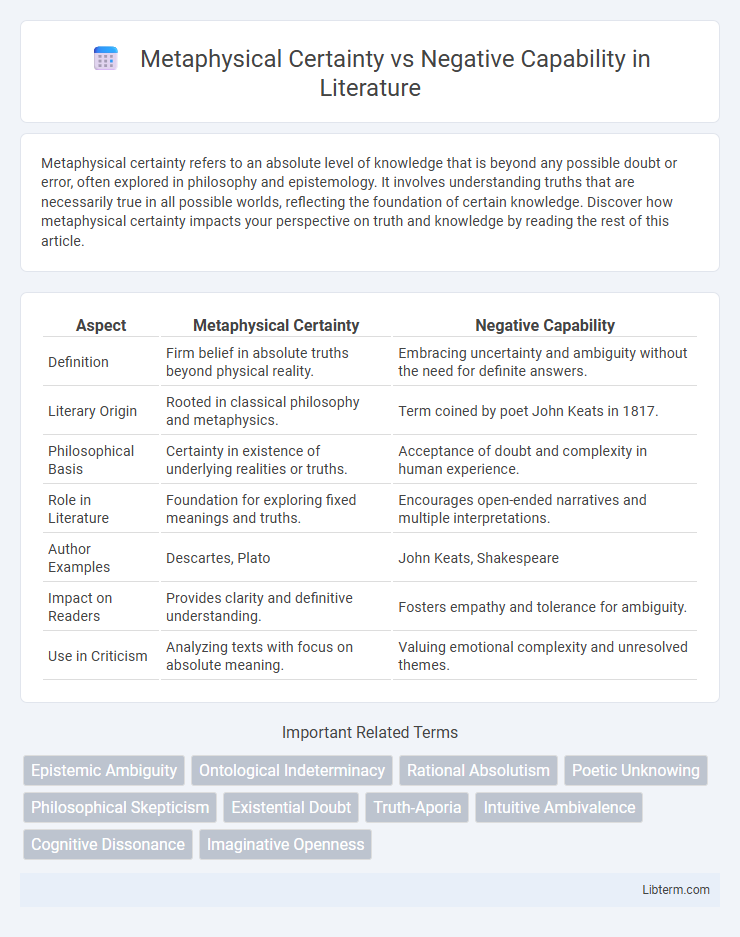Metaphysical certainty refers to an absolute level of knowledge that is beyond any possible doubt or error, often explored in philosophy and epistemology. It involves understanding truths that are necessarily true in all possible worlds, reflecting the foundation of certain knowledge. Discover how metaphysical certainty impacts your perspective on truth and knowledge by reading the rest of this article.
Table of Comparison
| Aspect | Metaphysical Certainty | Negative Capability |
|---|---|---|
| Definition | Firm belief in absolute truths beyond physical reality. | Embracing uncertainty and ambiguity without the need for definite answers. |
| Literary Origin | Rooted in classical philosophy and metaphysics. | Term coined by poet John Keats in 1817. |
| Philosophical Basis | Certainty in existence of underlying realities or truths. | Acceptance of doubt and complexity in human experience. |
| Role in Literature | Foundation for exploring fixed meanings and truths. | Encourages open-ended narratives and multiple interpretations. |
| Author Examples | Descartes, Plato | John Keats, Shakespeare |
| Impact on Readers | Provides clarity and definitive understanding. | Fosters empathy and tolerance for ambiguity. |
| Use in Criticism | Analyzing texts with focus on absolute meaning. | Valuing emotional complexity and unresolved themes. |
Introduction to Metaphysical Certainty and Negative Capability
Metaphysical certainty refers to an unshakeable conviction in absolute truths or realities beyond empirical evidence, often rooted in philosophical or spiritual belief systems. Negative Capability, a concept introduced by poet John Keats, emphasizes embracing uncertainty and ambiguity without the need for definitive answers. Understanding these contrasting approaches highlights the tension between seeking absolute knowledge and accepting the limits of human understanding in metaphysical inquiry.
Defining Metaphysical Certainty
Metaphysical certainty refers to an absolute, unchanging truth that exists independently of perception or doubt, often grounded in philosophical or theological frameworks. It emphasizes definitive knowledge and the belief in objective reality that can be fully understood through reason or revelation. This contrasts with Negative Capability, which embraces uncertainty and the acceptance of ambiguity without the need for concrete answers.
Understanding Negative Capability
Negative Capability, a concept introduced by John Keats, emphasizes the ability to embrace uncertainty, ambiguity, and doubt without the urgent need for resolution or rational explanation. This mindset contrasts sharply with Metaphysical Certainty, which seeks absolute knowledge and definitive answers through logical reasoning and empirical evidence. Understanding Negative Capability involves cultivating intellectual humility and openness, allowing one to navigate complex, uncertain realities without premature closure.
Historical Origins of Both Concepts
Metaphysical certainty traces back to Descartes' 17th-century philosophy, emphasizing absolute knowledge founded on clear and distinct ideas. Negative capability, coined by poet John Keats in the early 19th century, originates from Romantic literature, highlighting the acceptance of uncertainty and ambiguity without the urge for concrete explanation. These contrasting concepts reflect distinct historical paradigms in Western thought, with metaphysical certainty grounded in Enlightenment rationalism and negative capability rooted in Romantic skepticism.
Key Philosophers and Thinkers Involved
Metaphysical certainty, championed by Rene Descartes, emphasizes absolute knowledge derived through rational deduction, asserting the existence of a foundational truth immune to doubt. In contrast, Negative Capability, a concept developed by poet John Keats, embraces uncertainty and ambiguity as essential to creative and intellectual openness, rejecting the need for definitive answers. Philosophers such as Soren Kierkegaard and Ludwig Wittgenstein also contributed by exploring existential ambiguity and linguistic limits, further enriching the discourse on certainty versus intellectual openness.
Core Differences Between the Two Ideas
Metaphysical certainty involves an absolute assurance about reality, relying on fixed truths and definitive knowledge, often rooted in philosophical or theological frameworks. Negative capability embraces uncertainty and ambiguity, emphasizing the acceptance of mysteries without seeking immediate answers or clear distinctions. The core difference lies in metaphysical certainty's pursuit of definitive understanding versus negative capability's comfort with unresolved complexity and doubt.
The Role of Doubt and Ambiguity
Metaphysical certainty seeks absolute knowledge and definitive answers, often rejecting doubt as a barrier to truth, whereas negative capability embraces ambiguity and uncertainty as essential to deeper understanding. The role of doubt in metaphysical certainty is typically to be overcome or eliminated, while in negative capability, doubt is integral, encouraging open-ended exploration and creative thought. This contrast highlights how certainty demands clear resolution, while negative capability values the productive potential of unresolved questions and ambiguous experience.
Metaphysical Certainty in Modern Thought
Metaphysical certainty in modern thought represents the unwavering belief in absolute truths and objective realities, often rooted in rationalism and foundationalism. This concept emphasizes the existence of knowable essences and universal principles that transcend subjective experience and empirical doubt. Thinkers like Rene Descartes exemplify this pursuit of indubitable knowledge as a basis for scientific and philosophical inquiry.
Negative Capability in Contemporary Contexts
Negative Capability in contemporary contexts embodies the capacity to embrace uncertainty and ambiguity without the compulsion for definitive answers, fostering creativity and open-mindedness. This philosophical concept, originally articulated by John Keats, challenges metaphysical certainty by valuing doubt and complexity over absolute truths. Modern applications in psychology, art, and leadership emphasize Negative Capability as essential for navigating dynamic environments and cultivating innovation.
Implications for Knowledge and Human Experience
Metaphysical certainty, grounded in absolute truths and unchanging realities, shapes knowledge by promoting definitive understanding and universal principles, whereas negative capability embraces uncertainty and ambiguity, fostering a more flexible, open-ended approach to human experience and intellectual inquiry. The implications for knowledge reveal a tension between the desire for objective, stable truths and the acceptance of doubt as a means to deeper insight and creativity. In human experience, metaphysical certainty provides a foundation for meaning and security, while negative capability encourages resilience and adaptability amidst complexity and contradiction.
Metaphysical Certainty Infographic

 libterm.com
libterm.com